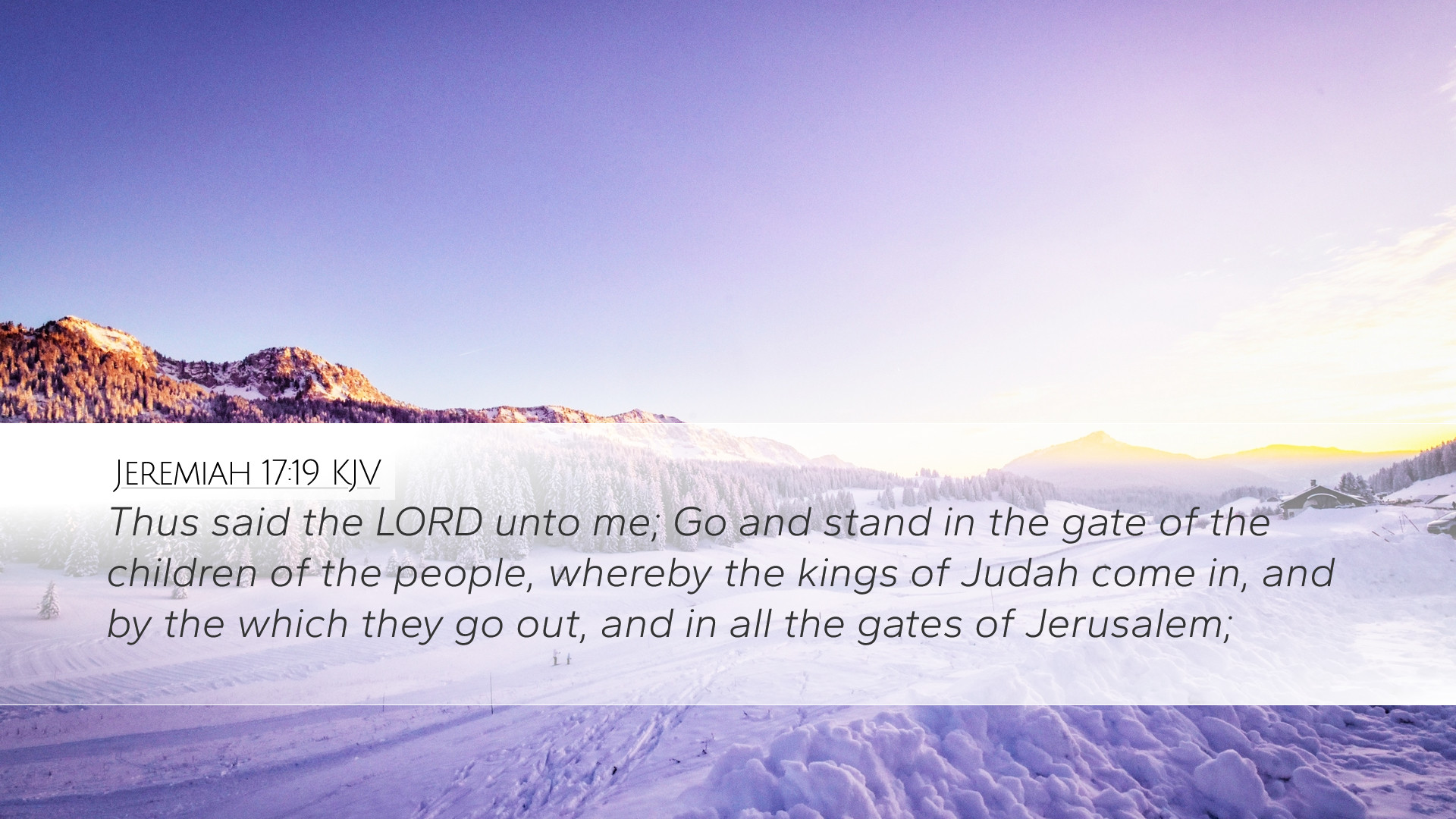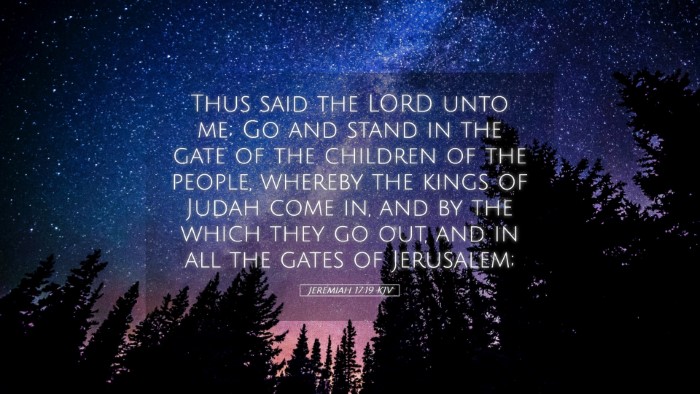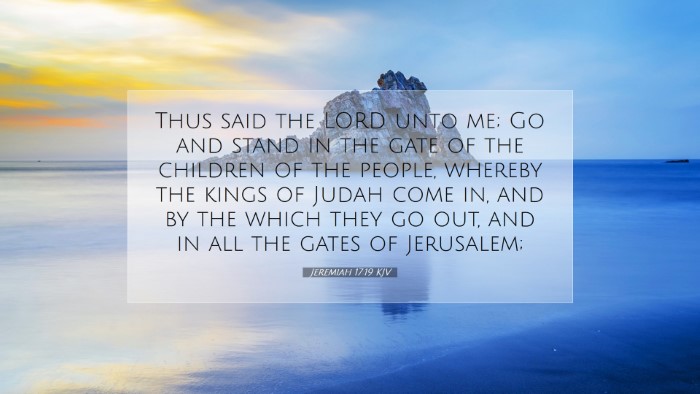Commentary on Jeremiah 17:19
Verse Text: "Thus said the Lord unto me; Go and stand in the gate of the children of the people, whereby the kings of Judah come in, and by the which they go out, and in all the gates of Jerusalem;" (Jeremiah 17:19, KJV)
Introduction
Jeremiah 17:19 marks a significant moment in the prophetic ministry of Jeremiah. This verse initiates a broader discourse on the responsibilities and duties of the prophet, as well as the response of the people to God’s commands. The context in which Jeremiah operates is fraught with spiritual decline and impending judgment on Judah. The following commentary synthesizes insights from several public domain commentaries to illuminate this important scriptural passage.
Contextual Significance
To understand Jeremiah 17:19 fully, it is essential to consider its contextual framework. Jeremiah, often referred to as the “weeping prophet,” was called to deliver messages of repentance to a wayward nation. The preceding verses emphasize the necessity of turning back to God, highlighting the blessings that follow obedience and the curses that come with disobedience (Jeremiah 17:5-18).
Divine Instruction
Matthew Henry notes that God's command for Jeremiah to stand in the gate signifies the importance of public proclamation. The gates of the city were critical junctions where important decisions were made and where local leaders convened. Thus, Jeremiah's position at the gate symbolizes the urgency of delivering God’s message to both rulers and common citizens. It serves as a prophetic call not only to hear but to heed the Word of God.
Albert Barnes further emphasizes the significance of the location where Jeremiah is instructed to stand. The gates represent the point of entry and exit from the city, making it a strategic site for communication. The prophet's presence there indicates that every individual, regardless of status, is called to witness God's warnings and commands.
The Role of the Prophet
Jeremiah's role as a prophet is underscored throughout this passage. Adam Clarke expounds on the nature of prophetic ministry, illustrating that the prophet is a messenger of divine truth, tasked with challenging worldly attitudes and advocating for spiritual renewal. Clarke suggests that Jeremiah's ministry at the gates reflects a broader theme in the Bible: prophets often confront societal norms and values, calling individuals back to a covenant relationship with God.
The Importance of Obedience
The call to stand at the gate also underscores the theme of obedience. Matthew Henry points out that standing at the gate is a tangible example of action taken in obedience to God’s word. It starkly contrasts with the disobedience of the people of Judah, who have repeatedly turned away from the Lord. The presence of the prophet is intended to urge a return to obedience, as it is the pathway to blessing and protection in the face of impending judgment.
Symbolism of the Gates
Albert Barnes remarks on the gates themselves as symbols of societal structure and governance. The gates not only serve as physical barriers but also as spiritual thresholds. Jeremiah’s station at these gates serves as an important reminder that leadership must align with divine principles. The gates symbolize the threshold of decision-making where the kings of Judah would enter and exit; hence, it is crucial for them to be reminded of their moral and spiritual responsibilities.
Call to Accountability
By commanding Jeremiah to stand at the gates, God calls upon the leaders and people alike to reflect on their actions and the consequences thereof. Adam Clarke emphasizes that the prophets were to hold the nation accountable for their covenant with God. This accountability extends to all facets of life, including the moral and ethical decisions of those in power. It illustrates the interconnectivity of secular authority and divine expectation.
Application for Today
For modern pastors, students, and theologians, the message contained within Jeremiah 17:19 serves as a profound reminder of the necessity of public witness and accountability. It challenges church leaders to engage actively with their communities, standing as representatives of God's truth and justice in the contemporary world.
- Public Engagement: The verse speaks to the need for Christians to be actively involved in societal issues, standing firm in their faith while addressing the moral dilemmas of today.
- Prophetic Voice: The importance of being a prophetic voice, akin to Jeremiah, is highlighted—calling society to repentance and action based on the principles laid out in Scripture.
- Leadership Accountability: It serves as a challenge to those in leadership positions to ensure that their governance reflects the values of the Kingdom of God.
Conclusion
Jeremiah 17:19 stands as a pivotal verse that calls both prophet and people to attentiveness to God's Word. The insights derived from Matthew Henry, Albert Barnes, and Adam Clarke converge to emphasize the weight of prophetic ministry and divine instruction. As we reflect on this verse, we are reminded of our call to uphold the truth of God in every aspect of life, fostering communities that reflect God's righteousness and justice.


